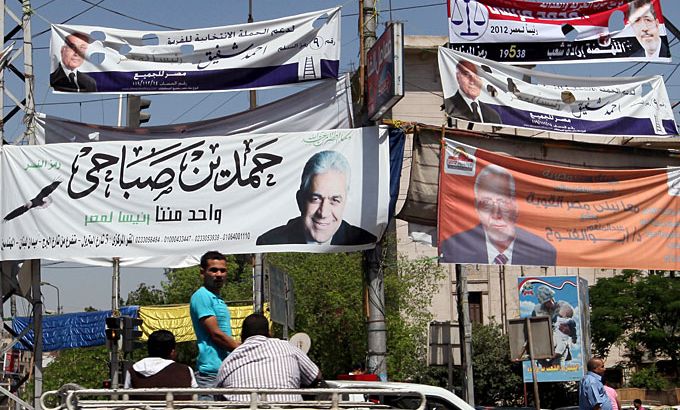
What kind of leader do Egyptians want?
As Egyptians go to the polls to elect a new president, we ask what kind of power the winner will have.
Egyptians have begun the process of electing a new president and for the first time ever they have a real choice. But what kind of leader do the people want and what kind of power will the winner have?
|
“You are forced to vote for a president without knowing how much executive power he would have … after the constitution is formed …. So we don’t know if he has any ability to implement the programmes and the promises made.” – Mohammed Waked, a member of the National Front for Justice and Democracy |
After months of instability and sporadic outbreaks of violence, Egyptians are taking another step towards establishing a new democracy; having put a parliament in place, some 50 million eligible voters now have the opportunity to choose who is going to be president.
It is a vote that could signal an end to decades of what has effectively been military rule. But it is still not certain exactly how much executive power the generals who have been running the country since the fall of Hosni Mubarak will be willing to cede. The new president is being elected without a constitution to define his powers.
Thirteen candidates with competing religious and political ideologies are vying for a position that, in the past, was essentially the preserve of one.
The outcome is truly unpredictable. In this infant democracy, the polling is widely inaccurate and generally involves more propaganda than science.
|
“Egyptians need a strong leader but with political experience, with a real platform that can be applied on the ground and have a group of faithful experts around him ….” – Dina Zakaria, a founder of the Freedom and Justice party |
Some seek to find a barometer in the results of parliamentary election – where the parties that define themselves as Islamist emerged dominant. But this is the election of an individual, where personality may play a greater determining role than ideology.
The challenges facing the incoming president include poverty, corruption and improving public security. Another major issue will be relations with Israel.
Joining presenter Mike Hanna on this special edition of Inside Story from Cairo are guests: Dina Zakaria, a founder of the Freedom and Justice party; Mohammed Waked, a member of the National Front for Justice and Democracy; and Abdullah al Arian, an assistant professor of Middle East history at Wayne University.
|
“All Egyptians want someone who is going to end the period of transition. The real question that then divides all Egyptians is what that resolution will look like, and we have vastly differing opinions on that.” Abdullah al-Arian, an assistant professor of Middle East history at Wayne University |
THE EGYPTIAN PRESIDENTIAL ELECTION:
- Egyptians vote on May 23 and 24 to elect a new president from among 13 candidates
- A run-off is scheduled for June if no clear winner emerges in the first round
- Egypt has an estimated 53 million eligible voters – the election commission expects more than 60 per cent to cast their votes
- A new president is being elected without a constitution to define his powers
- This is the first presidential poll since Hosni Mubarak was deposed in February 2011